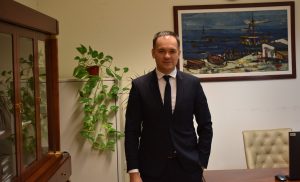Membership in the OECD is one of Croatia’s strategic goals.
With unstable political situation in the Europe and Europe, very important is to maintain good economic opportunities. Croatia has started negotiations on joining the “club of the richest countries in the world“. Also, every visit of the minister Gordan Grlić Radman abroad is used to strenghten economic cooperation. Mr Zdenko Lucić, Secretary of State for Foreign Trade and Development Cooperation for Diplomacy & Commerce talk about plans of the Ministry in the economic domain.

- After many years, Croatia has received an invitation to start negotiations with the OECD. What does this mean for Croatia?
The decision of the OECD Council took into consideration progress made in four main areas – like-mindedness, significant player, mutual benefit and global consideration. In this context, the Government invested significant efforts that resulted in the formal decision, which we received on 25th January 2022. Our cooperation with OECD dates back to 1993 and has increased over the years. We have been implementing various reforms across a range of policy areas such as ensuring sustainable growth, attraction of foreign investments, promotion of domestic private sector development and encouragement of responsible business conduct, etc. We are committed to reforms, alongside the accession process, for the benefit of our country and our people, to improve the quality of life, enhance business environment, while also contributing to the OECD like-minded community committed to a rules-based international order.
- What is expected from Croatia now? What is the scope of work that awaits us and which sectors does it cover?
The Accession Roadmap, which is being prepared by the OECD, will set out the terms and conditions of the accession process. This process will involve an evaluation of Croatia’s alignment to the legal instruments, policies and standards of the Organisation, which will be achieved in close cooperation with the OECD. In this regard, the Government established a Negotiating team for the accession with all relevant ministries and institutions included in its work. Coordination of the Negotiation team is within the MFEA, with Minister of Foreign and European Affairs, Mr Gordan Grlić Radman being the Chief negotiator.
- The Ministry of Foreign and European Affairs has strengthened the economic and trade dimension. What are the results of that action?
One of our main goals is assisting Croatian companies in foreign markets in finding relevant partners and promoting investment possibilities. Business forums that often follow official visits proved to be a successful model for strengthening economic cooperation – both in terms of attracting investments and helping companies find partners in certain markets. Thanks to this model of cooperation, we were able to increase our presence on various markets.
- Political talks during Minister Grlić Radman’s visits to Algeria, Egypt and Azerbaijan were followed by economic forums in those countries. What are the results of these meetings?
I am glad to say that in all three countries there was a great interest for participation of Croatian and local business entities. The forums were well attended. The companies had the opportunity to meet their respective partners and discuss possibilities of closer cooperation. We have to stress out the important role of the Croatian Chamber of Commerce in this process, which is essential in communication with companies, preparations and organization of these forums.
- Development projects are also within your scope. What is the dynamics of the implementation of such projects during the pandemic, has it slowed down plans? What projects are currently in focus?
The COVID-19 pandemic revealed the need to keep development policy priorities high on our agenda, since they encompass the most advanced principles in relation to human rights, rule of law, labor rights, open economies and environmental protection. This global crisis encouraged us to find innovative ways to respond more rapidly and more effectively to emergencies and assist our partner countries in efforts to bring sustainable economic growth to their citizens. I would like to emphasize that we have, in the spirit of solidarity with countries most in need, donated over 2 million doses of the COVID-19 vaccine so far. At the same time, we remain strongly committed to our neighboring countries in South East Europe, with the priority being Bosnia and Herzegovina. Regarding projects that are currently underway, the thematic focus is on education, health and empowerment of women, girls and youth.